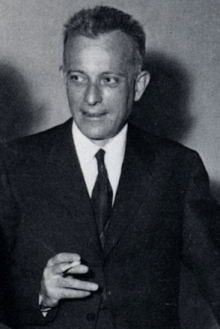Giulio Einaudi

Giulio Einaudi (Italian pronunciation: [ˈdʒuːljo eiˈnaudi]; 2 January 1912 – 5 April 1999) was an Italian book publisher. The eponymous company that he founded in 1933 became "a European wellspring of fine literature, intellectual thought and political theory"[1] and was once considered the most prestigious publishing house in Italy.[2] He was also the author of books on literature, history, philosophy, art and science.[1]
Biography
Giulio Einaudi was born in
He attended the Liceo Classico Massimo d'Azeglio,[4] and became a student of the anti-fascist Augusto Monti.
On 15 November 1933, he founded the publishing house
Over his career, Einaudi published works by
In 1994, Einaudi's company was taken over by
Family
Einaudi was married to Renata Aldrovandi and had three sons, Mario, Riccardo and Ludovico, and a daughter, Giuliana.[1] Ludovico is a pianist and composer.[5]
References
- ^ a b c d Saxon, Wolfgang, "Giulio Einaudi, Italian Author And Publisher, Is Dead at 87", The New York Times (Archives), April 7, 1999.
- ^ "Einaudi", in Gino Moliterno (ed.), Encyclopedia of Contemporary Italian Culture, Routledge, 2002, p. 276. Reference to 'GIUNIO LUZZATTO' at opening of excerpt unrelated to Einaudi; via Google Books. Retrieved 2020-11-02.
- ^ a b Hanley, Anne, "Obituary: Giulio Einaudi", The Independent, April 19, 1999.
- ISBN 1139827405, 9781139827409. CITED: p. 11.
- ^ "Bio / More About Ludovico Einaudi", rockpaperscissors.biz. Retrieved 5 June 2016.
